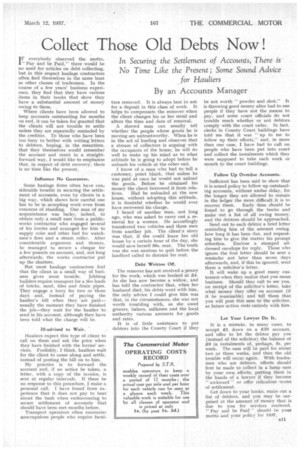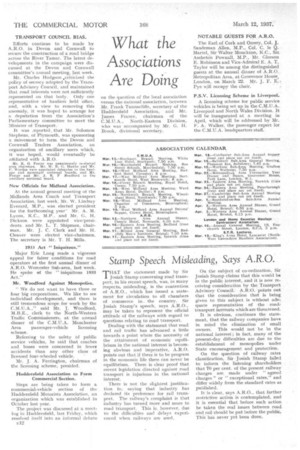Collect Those Old Debts Now!
Page 45

Page 46

If you've noticed an error in this article please click here to report it so we can fix it.
I F everybody observed the motto, " Pay and be Paid," there would be no need for articles on debt collecting, but in this respect haulage contractors often find themselves in the same boat as other classes of tradesmen. In the course of a few years' business experience, they find that they have various items in their books that show they have a substantial amount of money owing to them.
Where clients have been allowed to keep accounts outstanding for months on end, it can be taken for granted that the clients will not trouble to settle unless they are repeatedly reminded by the creditor. To those who have been too busy to bother with writing letters to debtors, hoping, in the meantime, that they themselves would remember the account and remit in a straightforward way, I would like to emphasize that, in respect of debt recovery, there is no time like the present.
Influence No Guarantee.
Some haulage firms often have con; siderable trouble in securing the settlement of accounts, even by clients in a big way, which shows how careful one has to be in accepting work even from concerns of standing. One man of my acquaintance was lucky, indeed, to obtain only a small sum from a publicworks contractor who engaged several of his lorries and arranged for him to supply coke and other fuel for watchmen's fires and a steam roller. After considerable argument and threats, he managed to secure a cheque for a few pounds on account, and, not long afterwards, the works contractor put up the shutters.
But most haulage contractors find that the client in a small way of business gives most trouble. Jobbing builders require transport for a few loads of bricks, sand, tiles and drain pipes. They engage a lorry, for two or three days and, instead of paying the haulier's bill when they are paid— usually the moment they have finished the job—they wait for the haulier to send in his account, although they have been told what the charge will be.
Ill-advised to Wait.
Hauliers expect this type of client to call on them and ask the price when they have finished with the lorries' services. Foolishly. I think, hauliers wait for the client to come along and settle, instead of posting the bill on to him.
My practice is to forward the account and, if no notice be taken, a letter, with a copy of the invoice, is sent at regular intervals. If there be no response to this procedure, I make a personal call. I have found from experience that it does not pay to beat about the bush when endeavouring to secure settlement of accounts that should have been met months before.
Transport operators often encounter unscrupulous people who require furni
ture removed. It is always best to ask for a deposit in this class of work. It helps to compensate the remover when the client changes his or her mind and alters the time and date of removal.
A shrewd man can usually tell whether the people whose goods he is moving are untrustworthy. When he is in the act of loading and observes that a stream of collectors is arguing with the occupants of the house, he will do well to make up his mind as to what attitude he is going to adopt before he unloads his vehicle at the other end.
I know of a man who had to tell a customer, point blank, that unless he was paid at once he would not unload the goods. Before he obtained his money the client borrowed it from relatives, Had he unloaded at the new house, without adopting this attitude, it is doubtful whether he would ever have recovered his charge.
I heard of another man, not long ago, who was asked to carry out a removal for a woman. He accordingly transferred two vehicles and three men from another job. The client's story was that, if she could leave her old house by a certain hour of the day, she would save herself 30s. rent. The truth was she was anxious to quit before the landlord called to distrain for rent.
Debt Written Off.
The remover-has not received a penny for the work, which was booked at 24. As she has now become a widow, and has told the contractor that, when her husband died, his debts went with him, the only advice I could give him was that, in the circumstances, she was not worth troubling with, as she owed grocers, bakers, milkmen and the local authority various amounts for goods and rates.
It is of little assistance to put debtors into the County Court if they be not worth "powder and shot." It. is throwing good money after bad to sue people if they have not the means to pay, and some court officials do not trouble much whether or not debtors comply with the court order. In fact. clerks in County Court buildings have told me that it was "up to me to follow up their efforts," and, in more than one case, I have had to call on people who have been put into court and collect the instalments which they were supposed to take each week or month to the court buildings.
Follow Up Overdue Accounts.
Sufficient has been said to show that it is sound policy to follow up outstanding accounts, without undue delay, for the longer they are allowed to remain in the ledger the more difficult it is to recover them. Early time should he found to go through the books and make out a list of all owing money, and the debtors should be approached.
Send out to each debtor a brief letter reminding him of the amount owing, how long it has been due, and requesting him to give the matter his prompt attention. Enclose a stamped addressed envelope for reply. Those who ignore the first letter should be sent a reminder not later than seven days afterwards, and, if this be ignored, send them a solicitor's letter.
It will wake up a good many customers when they realize that you mean business. Should they call to see you, on receipt of the solicitor's letter, take what money they offer on account (if it be reasonable) and tell them that you will post this sum to the solicitor, as future action rests entirely with him.
Let Your Lawyer Do It.
It is a mistake, in many cases, to accept 21 down on a 210 account, and offer to let the debtor pay you (instead of the solicitor) the balance of 29 in instalments of, perhaps, 5s. per week. The sum will be paid for about two or three weeks, and then the old trouble will occur again. With tradesmen who are debtors, efforts should first be made to collect in a lump sum by your own efforts, putting them in the hands of a lawyer if they become "
awkward" or offer ridiculous terms of settlement.
Get down to your books, make out a list of debtors, and you may be surprised at the amount of money that is due to you for services rendered. "Pay and be Paid" should be your motto and your policy for 1937, TRANSPORT COUNCIL BIAS.
Efforts continue to be made by A.R.O. in Devon and Cornwall to secure the construction of a road bridge across the River Tamar. The latest developments in the campaign were discussed at the Devon and Cornwall committee's annual meeting, last week.
Mr. Charles Hodgson ,criticized the policy of secrecy adopted by the Transport Advisory Council, and maintained that road interests were not sufficiently represented on that body. Only one representative of hauliers held office, and, with a view to removing this anomaly, it was hoped to arrange for a deputation from the Association's Parliamentary committee to meet the Minister of Transport.
it was xported, that Mr. Solomon Stephens, of Plymouth, was sponsoring a movement to form the Devon and Cornwall Traders Association, an organization of ancillary users which, it was hoped, would eventually be affiliated with A.R.O.
Mr. K. G. Foster was unanimously re-elected area chairman. Mr. W. R. (;. Hawke and Mr.
C. Worden were appointed delegates to the haulage and passenger sectional boards, and Mr. Foster and Mr. J. R. F Bradford to the ancillary sectional board.
New Officials for Midland Association.
At the annual general meeting of the Midlands Area Coach and Transport Association, last week, Mr. W. Lindsay Everard, M.P., was elected president for the forthcoming year' Mr. A. M. Lyons, KC., M.P.. and Mr. G. H. Dickson were appointed vicezpresi dents. and Mr. L. T. Shipman, chairman, Mr. J. C. Clark and Mr. H. Cleaver were elected vice-chairmen. The secretary is Mr. T. H. Mills.
1933 Act " Iniquitous."
Major Eric Long made a vigorous appeal for fairer conditions for road operators at the first annual dinner of A.R.O. Worcester Sub-area, last week. He spoke of the "iniquitous 1933 Act."
Mr. Woodford Against Monopolies.
We do not want to have three or four big corporations. We like to see individual development, and there is still tremendous scope for work by the C.M.IJ.A.," said Mr. J. Woodford, M.B.E., clerk to the North-Western Traffic Commissioners, at the annual dinner of the C.M.U.A. Manchester Area passenger-vehicle licensing scheme.
Referring to the safety Of public service vehicles, he said that coaches and buses were concerned in fewer accidents than any other class of licensed four-wheeled vehicle.
Mr. J. A. Ferrington, chairman of the licensing scheme, presided.
Huddersfield Association to Form Commercial Section.
Steps are being taken to form a commercial-vehicle section of the Huddersfield Motorists Association, an organization which was established in October last year.
The project was discussed at a meeting in Huddersfield, last Friday, which resolved itself into an informal debate




















































































